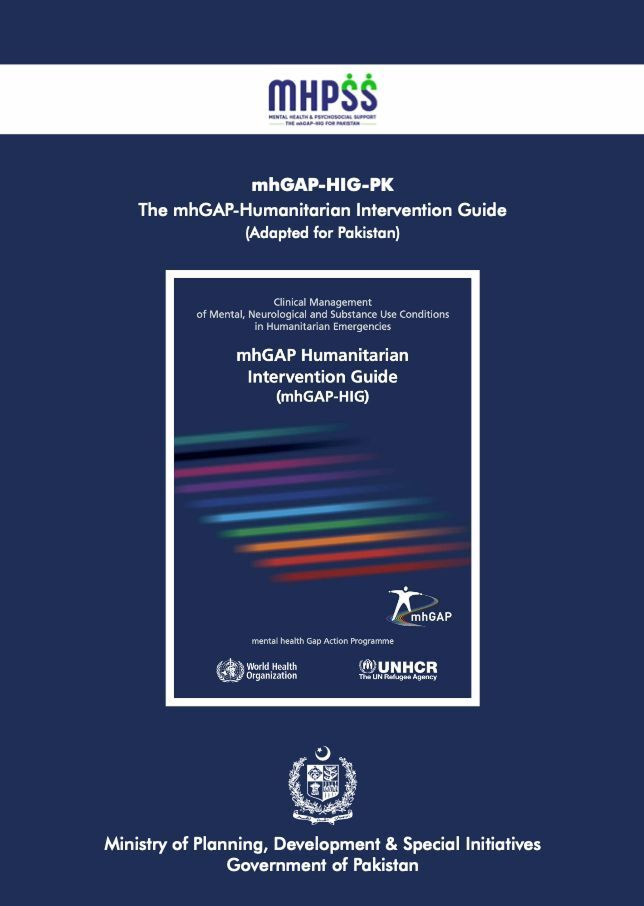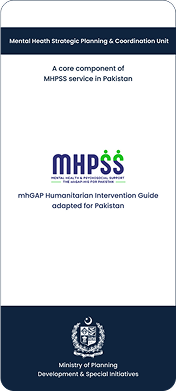The World Health Organization recommends the delivery of mental healthcare services to be integrated in the general health care and community mental health services, away from psychiatric hospitals. This transition requires scaling up of evidence-based care by task-sharing approach through general healthcare workers and community providers, and using digital technologies for remote service delivery and support.
Implementation challenges
Several challenges impact the capacity of non-specialists at the primary care level. These include gaps in knowledge, practical skills, and attitudes toward mental health care. Most providers have limited pre-service training in mental health and struggle to identify and manage common clinical presentations existing in local healthcare and cultural context. Cultural beliefs, stigma, and provider bias further complicate effective service delivery. In addition, many providers work in settings with fragmented or unregulated clinical practices that rarely involve patients or families in planning treatment, leading to a persistent gap between knowledge and practice.
The lack of training resources, structured supervision, and formal referral pathways makes it difficult to sustain quality care. Human resources are not only scarce at primary and tertiary care for service provision but also for supervision. Most healthcare workers receive no ongoing guidance after initial training. Specialists are also not incentivized to support non-specialists due to the absence of formal supervision systems, career progression opportunities, or data systems for tracking outcomes. These gaps limit the integration of mental health into general healthcare.
Resources for training and supervision
To address these challenges, the Mental Health Gap Action Program, Humanitarian Intervention Guide (mhGAP-HIG) by the WHO [1] has been contextualized for Pakistan. The mhGAP-HIG is a concise, practical, and easy-to-use tool for resource-limited settings. It has been designed to train non-specialists to assess and manage conditions which are prevalent in emergency settings like acute stress, grief, depression, post-traumatic stress disorder, psychosis, epilepsy, intellectual disability, harmful substance use and risk of suicide. Figure 4.4 here displays the title page of the mhGAP-HIG-PK guide.
The contextualization of the mhGAP-HIG followed a rigorous, evidence-informed, and participatory process, guided by World Health Organizations’ recommended methodology for contextualization.
At the initial stage, four implementation gaps i.e. knowledge, skills and attitude, knowledge-to-practice, training resource, and supervision gaps were identified through a situational analysis, focused group discussions, and key informant interviews.

These gaps were addressed through a multiphase process in contextualization. This included a multi-stakeholder adaptation workshop and a Delphi consensus approach to systematically revise the content of mhGAP-HIG. The adapted guide for Pakistan (mhGAP-HIG-PK) was launched in 2022 as a national resource [2].
The protocols in the mhGAP-HIG highlight the areas to be examined but do not direct how to do so. For example, based on a diagnostic criterion for a disorder, a list of symptoms is provided in the mhGAP-HIG. There is likely to be a wide variation between how non-specialists will apply these protocols after their training. In Pakistan, the predominant model of healthcare is bio-medical and the pre-service training in recognizing mental health conditions is limited. As a result, there is little emphasis on interview skills and basic psychosocial interventions. Therefore, detailed clinical tools including interview questions, intervention techniques and examination techniques have been added, both in English and Urdu.

To support training and supervision, the mhGAP-HIG-PK mobile application (android and IOS) has been developed. The app serves as a complete reference to the training guide and important clinical protocols for the assessment and management and offer easy navigation, limited text entry, and the option to work offline. Figure 4.5 here displays the home screen of mhGAP mobile application.
Users can choose between English and Urdu and access, indexed and color-coded modules as in printed mhGAP-HIG on the homepage. The app also includes features for submitting clinical cases, seeking supervision (urgent or regular), and tracking follow-up care.
The digital tools directly address the challenge of supervision and the absence of referral mechanisms. After registering on the MHPSS web portal, primary care providers can use the app to enter clinical case details, including demographics, presenting symptoms, provisional diagnosis, and management plans.
They can later update follow-up information at any time. Supervisors access these cases through the portal, review them, and document clinical outcomes.
Means of verification
To evaluate the effectiveness of the training, assessment tools have been adapted and translated to evaluate the knowledge, skills, confidence, and attitudes. These include:
Knowledge: To test knowledge, the mhGAP-HIG assessment questionnaire consisting of 26 items, has been adapted.
Skills – To assess common therapeutic skills such as active listening, communication, rapport building, and risk assessment, ENhancing Assessment Common Therapeutic factors (ENACT) tool has been adapted for Pakistan [3] [4]. It is challenging to implement the original ENACT tool due to limited resources and training duration. Therefore, the ENACT tool has been adapted and redesigned through multiple rounds of consultations with experts (FGDs) for remote assessment. The adapted tool uses scripted role plays and prompt-based instructions for both participant and actors. Evaluators assess performance through recorded sessions.
Confidence - To assess the confidence of PCPs to identify and manage common mental disorders after mhGAP training, confidence questionnaire [5] [6] has been adapted and validated for Pakistan.
Attitudes - To assess attitudes of PCPs towards people with mental illness, Mental Illness Clinicians' attitudes (MICA-4) scale has been adapted, and validated. This scale is the preferred choice to assess attitude across a wide range of disciplines and is validated globally [7] [8].
Wellbeing: A self-reporting 12-items screening tool (General health questionnaire - 12) has been integrated to assess the mental well-being of PCPs.
References
World Health Organization & UNHCR, 2015 https://www.who.int/publications/i/item/9789241548922
MoPD&SI, 2022 https://www.pc.gov.pk/uploads/downloads/mhGAP-HIG-PK.pdf
Spedding et al., 2022 https://doi.org/10.1017/gmh.2022.40
World Health Organization, 2021 https://equipcompetency.org/2022-07/ENACT_inperson_published_220321.pdf
Kokota et al., 2020 https://doi.org/10.1186/s13033-020-0337-0
Ahrens et al., 2020 https://doi.org/10.1186/s13033-020-00345-y
Gabbidon et al., 2013 https://doi.org/10.1016/j.psychres.2012.09.028
Kassam et al., 2010 https://doi.org/10.1111/j.1600-0447.2010.01562.x
Mental Health Strategic Planning & Coordination Unit Health Section Ministry of Planning, Development & Special Initiatives